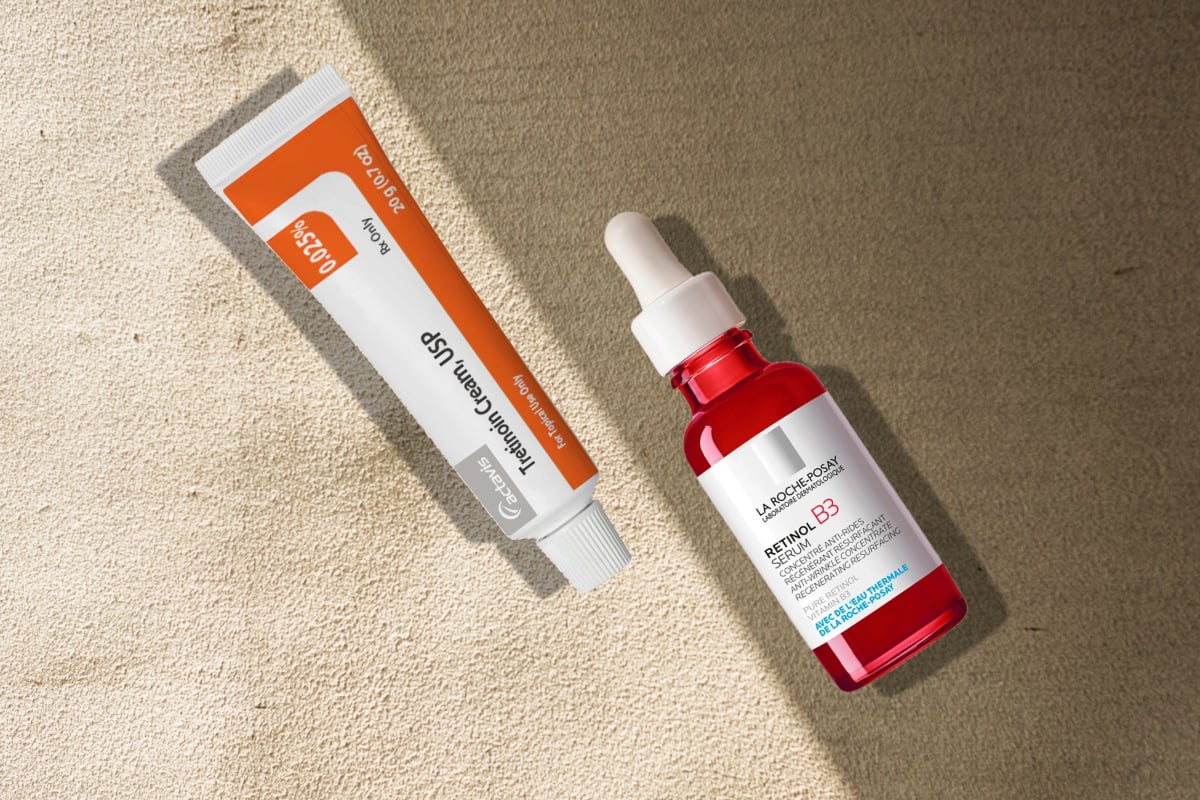A tiny mineral with the power to transform your complexion from dull to radiant, from troubled to clear? Yes, that’s zinc in a nutshell. This mineral is an essential micronutrient that our body needs to function optimally, but did you know it also has a host of benefits for the skin? From reducing inflammation and fighting acne bacteria to providing protective and restorative effects, zinc isn’t just a backstage player in our bodies, it’s a standout multitasker for skin too. Below we discuss its various forms and look at the benefits it brings to your skincare routine.
What is zinc?
Zinc is a trace Earth-derived mineral found in the body cells and plays a pivotal role in keeping skin healthy. It does this by helping to maintain the integrity of our DNA (like the blueprint of our cells), providing defense against harmful substances called free radicals, and regulating cell division (which is basically how our skin cells grow and renew themselves).[1] Zinc is also a big supporter of protein growth.
Although it’s an essential mineral needed by the skin to work at its best, zinc can’t be synthesized by the human body. This means we must take it from foods (like nuts, eggs, rice, and oats), supplements, or topical skincare products. But here’s the kicker: Zinc doesn’t stick around in our cells for long, so we should consume it regularly to maintain its levels optimal.
What are the skincare benefits of zinc?
Zinc has an impressive track record of skincare benefits. Here are the most researched ones:
Treats acne
Multiple studies have shown that both oral and topical zinc can lower inflammatory acne.[2] They even found a correlation between the severity of acne and zinc levels in the body, suggesting that people with acne are often running low on this mineral.[3]
Zinc has a range of mechanisms that work to improve your breakout-prone skin. The antibacterial benefits effectively eliminate acne-causing bacteria, and when it comes to those inflamed pimples, zinc swoops in with anti-inflammatory abilities to calm the redness and swelling.
Balances oily skin
Sebum is the oily substance produced by our sebaceous glands. While it’s necessary for holding moisture in the skin and protecting it against external threats, an overproduction of sebum can lead to greasiness and clogged pores. Zinc works its magic by influencing a variety of cellular processes that help control sebum production.[4] By modulating these processes, zinc maintains a healthy balance of sebum, preventing excessive oiliness without completely drying out the skin.
Anti-inflammatory
Zinc can be effective in relieving eczema flare-ups and soothing rosacea and psoriasis.[5] It also calms the swelling caused by inflammation. Of all forms, zinc sulfate is particularly used to treat inflammatory conditions.[6]
Antimicrobial
Zinc, particularly zinc oxide and zinc gluconate, is an effective antimicrobial agent that blocks the growth of various bacteria in the skin.
Supports healing
When applied topically, this mineral not only protects your skin but also accelerates the healing process. If you’re dealing with minor cuts, scrapes, or even insect bites, applying zinc can effectively eliminate bacteria and promote faster tissue regeneration.
Regulates cell turnover
Zinc plays a leading role in normalizing keratinization, the process by which skin cells are formed and shed.[7] When keratinization is disrupted, dead skin cells can accumulate and mix with sebum, leading to clogged pores and acne. Zinc maintains the proper balance of cell turnover, which in turn reduces the buildup of dead skin and promotes a clear complexion.
As a regulator of cell growth, zinc can also help prevent dark spots, texture changes, scarring, and other forms of blemishes.
Sun protection
Do you know why zinc (actually zinc oxide) is the main selling pitch in most physical sunscreens—the ones that sit on top of the skin? It’s because zinc oxide is photostable and can absorb UVA and UVB rays. It acts as a physical barrier, protecting skin from sun damage. Plus, zinc is an antioxidant that eliminates cell-damaging free radicals induced by sun exposure.
Supports the skin barrier function
One study suggests that maintaining proper zinc levels is vital for supporting a healthy skin barrier function.[8] Zinc is actually an essential component of the outermost layer of the skin that supports the formation of the epidermal barrier and controls water loss.
Promotes collagen production
Collagen is a structural protein that provides strength and support to the skin. Zinc has a crucial role in the production of this protein by activating enzymes that break down and rebuild collagen molecules. This helps to create new collagen fibers and cross-links between them, which ultimately improves the skin’s strength and elasticity.
Forms of zinc in skincare products
- Zinc Oxide: This form of zinc is used in sunscreens and physical sunblocks. It provides broad-spectrum protection, acting as a physical barrier on the skin to block out harmful sun radiation and protect against photoaging.
- Zinc Pyrithione: Used in anti-dandruff shampoos and cleansers, zinc pyrithione combats issues like itching. It has anti-fungal and antibacterial properties.
- Zinc Gluconate: The zinc salt of gluconic acid. It’s often found in acne treatments and products to reduce inflammation. It regulates sebum production and can contribute to clearer skin.
- Zinc Sulfate: Used in various skincare formulations, including creams and lotions, zinc sulfate offers a range of benefits. It has astringent properties, soothes irritated skin, restores barrier function, and supports the skin’s natural healing process.
- Zinc PCA: PCA stands for pyrrolidone carboxylic acid, which is a compound that helps enhance the delivery and absorption of zinc into the skin. Zinc PCA is known for its sebum-regulating benefits.
Side effects and other concerns
While zinc is generally safe for use, you should still be mindful of a few things. Taking excessive amounts of zinc is known to cause nausea and digestive issues. When it comes to applying zinc topically, it’s rare but possible to experience skin irritation or allergic reactions. To play it safe, always do a patch test before applying the product all over your face.
How zinc deficiency affects your skin
When there is a deficiency of zinc, it can lead to a disruption of the skin barrier and impair its ability to protect against harmful substances. This disruption triggers an inflammatory response, which is a welcome sign for a range of skin issues, such as dryness, acne, eczema, and dermatitis. A zinc deficiency can also cause poor healing and delayed skin regeneration.
Vegetarians and vegans have a slightly higher risk of zinc deficiency since plant-based sources of zinc are not as readily absorbed by the body. Pregnant and breastfeeding women also have increased zinc needs, and if they don’t get enough through their diet, it can lead to deficiency.
How to incorporate zinc into your routine
Obviously, the best way to ensure your zinc intake is to have a healthy diet plan rich in foods that contain zinc, like oysters, seafood, seeds, nuts, and whole grains. The recommended daily amount of zinc for men is 11 mg, for women 8 mg, and for pregnant women 11-12 mg.[9] You can also take supplements to give your body a helping hand in maintaining optimal zinc levels. Supplements with 15–30 mg of zinc is a safe daily limit—it leaves room for additional minerals you will get naturally from food sources.
Your skincare routine is a good place to harness the benefits of zinc. Look for products containing zinc oxide, zinc PCA, or zinc gluconate. They’re especially effective for acne, blemishes, and oily skin. Another idea is to use zinc-based sunscreen to protect your skin from UV and give it an antioxidant boost. Don’t worry. Zinc teams up nicely with most skincare actives, like vitamin C and salicylic acid, so it should be fairly easy to incorporate it into your existing beauty routine.
References
Women’s Concepts uses reliable sources, including dermatologists’ insights, clinical trials, and scientific journals, to find accurate information and support all the facts shared in our articles. All statements and claims have clear and legit references. Read our editorial policy to learn more about our sources of information, our process of researching and fact-checking the content, and how our team strives to keep all articles updated, completed, and trustworthy.
- Gupta M, Mahajan VK, Mehta KS, Chauhan PS. Zinc therapy in dermatology: a review. Dermatol Res Pract. 2014;2014:709152. doi: 10.1155/2014/709152. Epub 2014 Jul 10. PMID: 25120566; PMCID: PMC4120804.
- Yee, BE, Richards, P, Sui, JY, Marsch, AF. Serum zinc levels and efficacy of zinc treatment in acne vulgaris: A systematic review and meta-analysis. Dermatologic Therapy. 2020; 33:e14252.
- Rostami Mogaddam M, Safavi Ardabili N, Maleki N, Soflaee M. Correlation between the severity and type of acne lesions with serum zinc levels in patients with acne vulgaris. Biomed Res Int. 2014;2014:474108. doi: 10.1155/2014/474108. Epub 2014 Jul 24. PMID: 25157359; PMCID: PMC4135093.
- Demetree JW, Safer LF, Artis WM. The effect of zinc on the sebum secretion rate. Acta Derm Venereol. 1980;60(2):166-69.
- Faghihi G, Iraji F, Shahingohar A, Saidat A. The efficacy of ‘0.05% Clobetasol + 2.5% zinc sulfate’ cream vs. ‘0.05% Clobetasol alone’ cream in the treatment of the chronic hand eczema: a double-blind study. J Eur Acad Dermatol Venereol. 2008 May;22(5):531-6. doi: 10.1111/j.1468-3083.2007.02533.x. Epub 2008 Feb 12.
- Sharquie KE, Najim RA, Al-Salman HN. Oral zinc sulfate in the treatment of rosacea: a double-blind, placebo-controlled study. Int J Dermatol. 2006 Jul;45(7):857-61. doi: 10.1111/j.1365-4632.2006.02944.x. PMID: 16863527.
- MacDonald RS. The role of zinc in growth and cell proliferation. J Nutr. 2000 May;130(5S Suppl):1500S-8S. doi: 10.1093/jn/130.5.1500S. PMID: 10801966.
- Ogawa Y, Kinoshita M, Shimada S, Kawamura T. Zinc in Keratinocytes and Langerhans Cells: Relevance to the Epidermal Homeostasis. J Immunol Res. 2018 Dec 9;2018:5404093. doi: 10.1155/2018/5404093. PMID: 30622978; PMCID: PMC6304883.
- https://ods.od.nih.gov/factsheets/Zinc-Consumer/




![Does resveratrol in red wine benefit your skin? While sipping on a glass of red wine can be a delightful experience, relying on it for skincare benefits is not the best idea. Sure, red wine contains a smidge of resveratrol, but let's put things into perspective. The concentration of resveratrol in red wine is relatively low. Red wines, specifically Pinot noir from France, typically contain 0.361-1.972 mg of resveratrol per liter.[8] To hit that reference dose of 500mg of resveratrol, you'd need to drink a lot of wine. We're talking about downing anywhere from 100 to 1000 glasses per day. It's a scene straight out of a wine lover's wildest dreams, but definitely not the healthiest approach. Resveratrol Benefits for Skin](https://womensconcepts.com/wp-content/uploads/2022/03/Resveratrol-Benefits-for-Skin.jpg)
